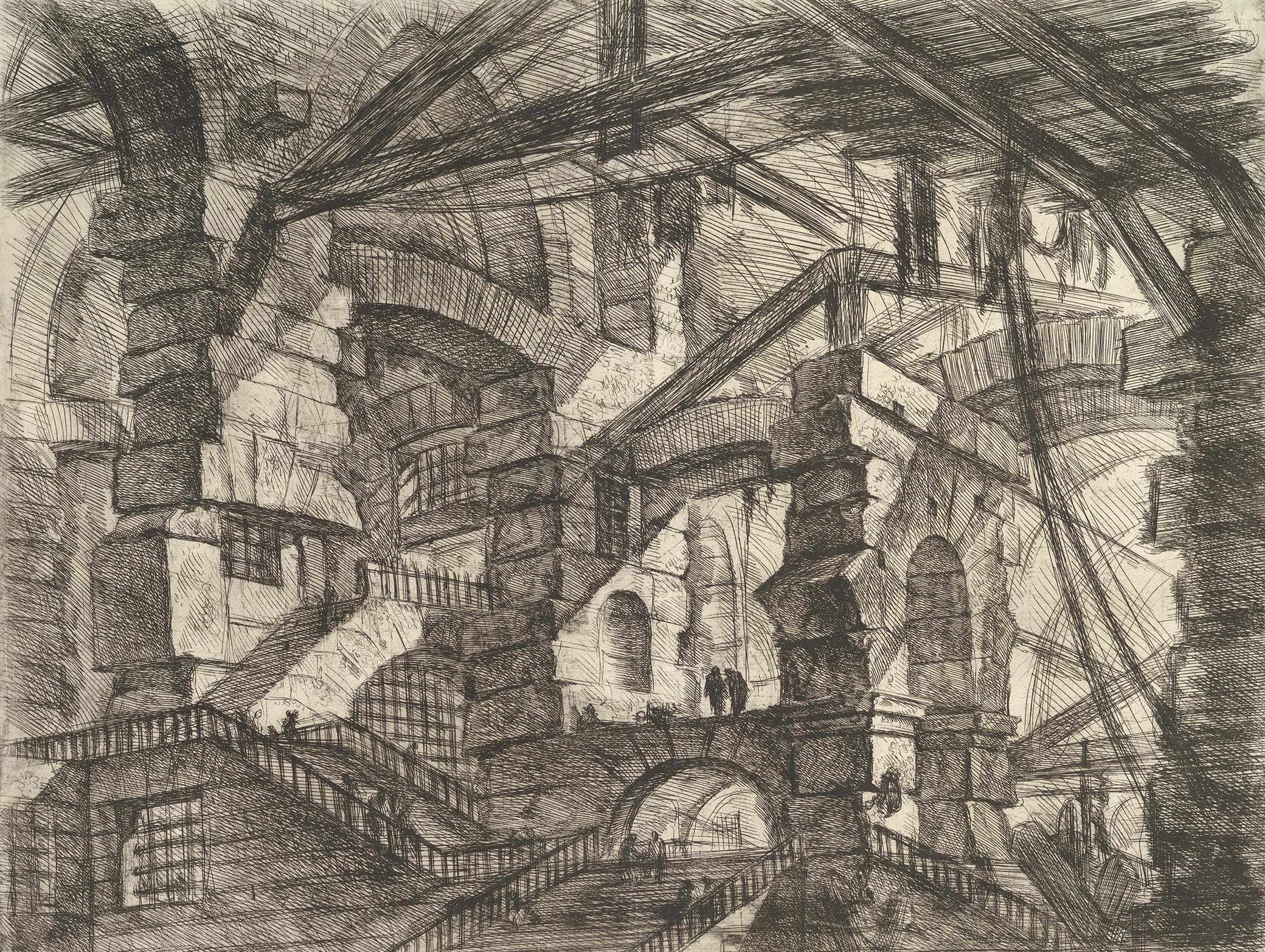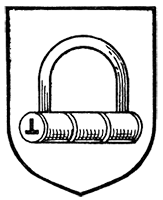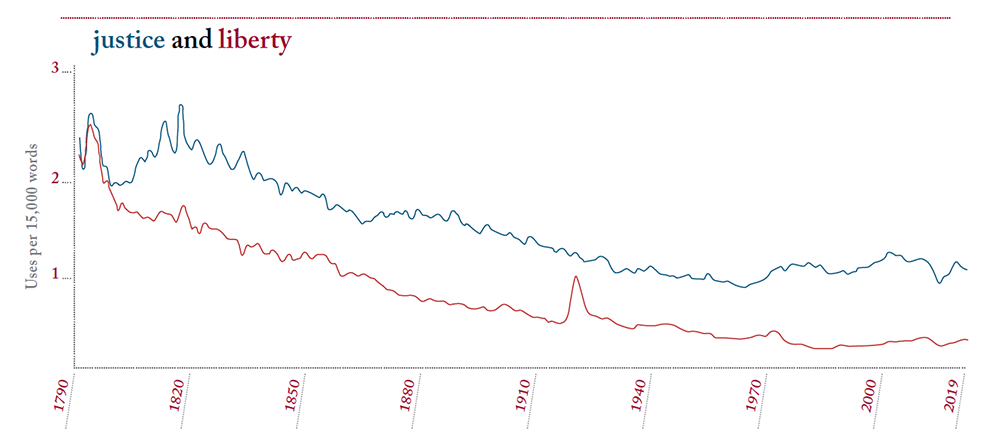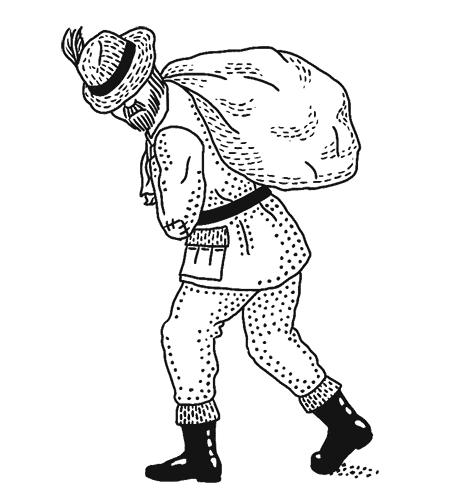
The Gothic Arch, from “Imaginary Prisons,” by Giovanni Battista Piranesi, c. 1749. The Metropolitan Museum of Art, Harris Brisbane Dick Fund, 1937.
attame: To attack, lay hands on, meddle with. From Latin attāmināre, to lay hands on, attack, violate.
biopower: The power of a political entity to regulate the lives of the populace. After French bio-pouvoir. “Hence there was an explosion of numerous and diverse techniques for achieving the subjugation of bodies and the control of populations, marking the beginning of an era of biopower.”—Michel Foucault, 1976
BolaWrap: A handheld remote restraint device that fires an eight-foot Kevlar tether to entangle an individual’s torso or legs. From bola, a weapon consisting of a number of balls connected by a cord; when thrown, it entangles the limbs of a quarry.
bondage: Arbitrary or tyrannical impost.
captive mirror: A fitting in a handbag that secures a mirror by means of chains.
carcerist: One who advocates or has to do with prisons. “How comes our loyal carcerist to forget all these sorts of tides?”—Sydney Smith, 1821
confine: To enclose or retain within limits; to fasten, secure, keep in place. From Italian confinare, to border upon, bound, limit, set limits to, banish.
copperstick: A police officer’s truncheon.
daiyo kangoku: 代用監獄 (Japanese) Lit., “substitute prison.” Detention cells in police stations that are used as legal alternatives to prisons. Suspects can be detained for as many as seventy-two hours without permission from a judge.
detain: To hold, hold down; translation of dētinēre from the Vulgate.
domesticate: To accustom an animal to live under the care and near the habitations of humans; to tame or bring under control. From participial stem of Latin domesticāre, to dwell in a house, to accustom. “There is hardly a tribe so barbarous as not to have domesticated at least the dog.”—Charles Darwin, 1861
encumber: To hamper, embarrass persons, their movements, actions, etc., with a clog or burden. Also of things: to act as a clog or restraint upon. From late Latin incombrāre, from in, in, upon, and combrus, barricade, obstacle, probably representing Latin cumulus, heap.

fetter
A chain or shackle for the feet of a human being or animal; hence gen. a bond, shackle; anything that confines, impedes, or restrains. Also, fetterlock, an apparatus fixed to the foot of a horse to prevent its running away. Compare Latin pedica, Greek πέδη, of identical meaning and root.
habeas corpus: (Latin) Lit., “thou shalt have the body.” A writ issuing from a court of justice requiring the body of a person restrained of liberty to be brought before a judge, so the lawfulness of the restraint may be determined.
handcuff: A lockable restraint consisting of a ring, typically made of metal and one of a pair joined by a short chain or bar.
hobble: (Slang) To take into custody, nab. First use in this sense, 1819.
hog-tie: To secure an animal by tying all four feet together or a person by tying hands and feet together; figuratively, to hinder the free action of. Originally U.S. “I was caught in a burglary, overpowered, hog-tied, and waiting for the wagon.”—Jack Black, 1926
immure: To shut up or enclose within walls; to imprison; to confine as in a prison or fortress. From medieval Latin immūrāre, from im- and mūrus, wall (compare late Latin mūrāre, to wall).
iron maiden: An instrument of torture consisting of an upright box lined with iron spikes into which a victim is shut. In extended use, an object that confines a person or body part. From German eiserne Jungfer (1751 or earlier); now usually eiserne Jungfrau.

manacle: A bond, a restraint. “In every ban, / The mind-forg’d manacles I hear.”—William Blake, 1794
obedience: “Obsequiousness; submission to authority; compliance with command or prohibition.”—Samuel Johnson, Dictionary of the English Language, 1755
oppression: An uncomfortable or distressing sense of physical or mental constriction, affliction, depression, or heaviness. “You and I hate Jacobinism as we hate the gates of hell. Why? Because it is a system of oppression.”—Edmund Burke, 1796
prison editor: An editor of a newspaper who takes legal responsibility for what is published and who serves any resulting term of imprisonment.
restrict: To prohibit or prevent. “Tho’ restricted from flesh meals by the rules of their order, they are allowed to eat wild duck and teal, as a species of fish.”—Tobias Smollett, 1763
RoboCop: A suspicious and hypervigilant romantic partner who is very controlling; one who searches a partner’s phone for evidence of infidelity.

sack man
A bogeyman figure who carries away naughty children in a gunnysack. In Spanish-speaking countries this character is known as el hombre del saco; in Portugal o homem do saco. In Haiti he is known as Tonton Macoute (“Uncle Gunnysack”), from whence François Duvalier’s secret police unit. Among the Sinhalese people he is known as Gonibilla.
seizure: The sudden confiscation or forcible taking of possession of land or goods. From Frankish Latin (eighth cent.) sacīre in the phrase ad propriam (or ad proprietatem) sacīre, to take into one’s possession, to appropriate. As the word sacīre is replaced by ponere in another example of the formula, its source is commonly believed to be the Germanic satjan, to place.
shackle: A fetter for a prisoner’s ankle or wrist, usually one of a pair connected by a chain, which is fastened to a ringbolt in the cell’s floor or wall. In Old English, a ring or collar for a prisoner’s neck. From Low German schakel, link of a chain, hobble for a horse; Dutch schakel; High German dialect schakel, link of a chain. Hence the shackles, the bonds of matrimony.
ShotSpotter: A gunshot-detection system that uses acoustic devices to identify the location of discharged firearms. Chicago’s ShotSpotter is one of the largest in the nation, covering approximately 117 square miles. “Results suggest that implementing ShotSpotter technology has no significant impact on firearm-related homicides or arrest outcomes.”—Journal of Urban Health, 2021
snare: A device for capturing small wild animals or birds, usually consisting of a string with a running noose in which a foot or head may be caught.
stricture: In various occasional uses: the action of binding tightly; tight closure; restriction. From Latin strictūra, from strict-, stringere, two etymologically distinct verbs of coincident form in Latin: one with the sense to bind, draw tight, strain; the other with the sense to touch lightly, to gather flowers, to draw a sword.
trammel: A type of net; figuratively, anything that hinders or impedes free action. Generally explained as from Latin tri-, three, and macula, mesh. The history of other senses is unclear. Charles du Fresne, seigneur du Cange, quotes a medieval Latin statute of Piacenza in which a tramaiolum is applied to a stick a cubit and a half long and then fixed to the necks of dogs to prevent them from running into vineyards where they might do mischief.
trap: A contrivance for catching game or noxious animals; a gin, snare, pitfall.
tyranny: Absolute sovereignty.
wild: Of persons or their attributes: uncivilized, savage; also, not accepting, or resisting, the constituted government; rebellious. Not under, or not submitting to, control. Acting or moving freely without restraint; going at one’s own will; unconfined, unrestricted. Primarily of animals, and hence of persons and things. “Youth is wild, and age is tame.”—attributed to Wm. Shakespeare, Passionate Pilgrim, 1599
Explore Freedom, the Spring 2023 issue of Lapham’s Quarterly.